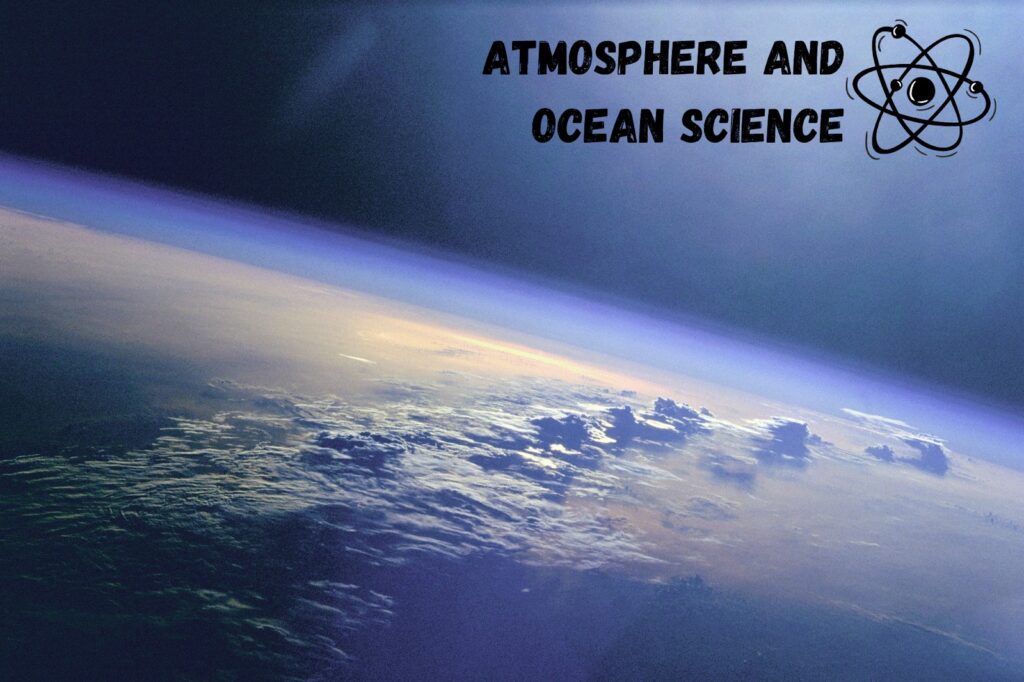Introduction to Atmosphere and Ocean Science and its Applications
Atmosphere and ocean science combine the disciplines of meteorology, climatology, oceanography, and other related sciences. This field is concerned with how Earth’s atmosphere and oceans interact with each other to influence global climate patterns. It also explores the physical, chemical, and biological processes that shape these environments. The atmosphere and ocean science is essential for understanding how natural phenomena such as hurricanes, monsoons, El Niño/La Niña events, ocean eddies, and other weather systems affect our planet. It also helps us understand the effects of human activities on climate change. For example, through research in this field, we can better understand the role of greenhouse gases in global warming.
The applications of atmosphere and ocean science are far-reaching. The data collected by scientists in this field can be used to develop better forecasting models for weather events such as storms or droughts. This data can also inform decisions about public health policies or agricultural practices. It can also help guide fisheries management efforts or inform conservation strategies for marine life. A career in atmosphere and ocean science offers a unique opportunity to impact our planet’s future. You could also use your knowledge to develop innovative technologies that improve our understanding of these complex systems or even reduce their impacts on society.
Benefits of Studying Atmosphere and Ocean Science
The first significant benefit of studying Atmosphere and Ocean Science is the vast knowledge gained in this area. This field covers various topics, from meteorology and climatology to oceanography and marine biology. By studying these topics, students will understand how the atmosphere and ocean interact and how they affect our environment. This knowledge can be applied to various industries, such as agriculture, energy production, and transportation.
Another great benefit of studying Atmosphere and Ocean Science is the job opportunities after graduation. Many different positions are available in this field, ranging from research to teaching. Graduates can find jobs in government agencies, universities, research institutions, or private companies with the right qualifications. These jobs offer excellent pay and often come with great benefits packages.
Finally, studying Atmosphere and Ocean Science allows students to make a difference in their community by using their knowledge to aid in environmental conservation efforts or disaster relief initiatives. By understanding how the atmosphere and ocean interact, students can help create solutions that will benefit everyone in their community.
Get Ready for an Exciting Career in Atmosphere and Ocean Science
Professionals use the latest technologies to study this field’s atmosphere, oceans, and climate. They may work in research or teaching positions or for government agencies or private companies. The job outlook in this field is strong, with many opportunities available for those with the right qualifications. Several educational paths are available for those interested in pursuing a career in atmosphere and ocean science.
A bachelor’s degree in meteorology or atmospheric sciences is usually required for entry-level positions. Other degrees that could be beneficial include physical oceanography and environmental science. Those who want further study can pursue a master’s degree or doctorate in these fields. Atmosphere and ocean scientists typically have a variety of job responsibilities, depending on their position and area of expertise.
Responsibilities of Atmosphere and ocean scientists
Some common responsibilities include
analyzing data from satellites and other instruments;
- conducting experiments;
- developing models;
- presenting research findings;
- educating students about the environment;
- writing reports;
- creating computer simulations; and
- advising government officials on climate-related issues.
The job market for atmosphere and ocean scientists is expected to grow over the next decade as more organizations look to hire experts who understand the complexities of our planet’s climate systems. Professionals with a background in this field can expect employment in energy production, natural resource management, weather forecasting, disaster preparedness, environmental consulting, and more.
Course Programs in the Field of Atmosphere and Ocean Science
Most universities offer specialized atmosphere and ocean science programs, including meteorology, climatology, oceanography, atmospheric physics, and marine biology. These courses provide an introduction to the theories and principles that govern our atmosphere and oceans. Additionally, some programs may also include courses related to geography, geology, chemistry, and mathematics.
In addition to traditional coursework, students may be required to complete laboratory work or field trips related to their studies. This hands-on experience allows students to gain a better understanding of how various systems interact with each other within our atmosphere and oceans. Atmosphere and ocean science degrees can be pursued at undergraduate and graduate levels. Those pursuing a graduate degree can specialize in certain aspects of the field, such as climate change or marine conservation. Depending on the program requirements, students may also be required to complete an internship or research project before graduating.
Institutes for Atmosphere and Ocean Science Course in India
- Indian Institute of Technology (IIT) Delhi: IIT Delhi offers a two-year Masters’s Program in Atmospheric and Oceanic Sciences. The program focuses on theoretical aspects of oceanography, meteorology, climate science, atmospheric chemistry, and air pollution.
- Indian Institute of Tropical Meteorology (IITM): IITM is one of the leading institutes for advanced studies in Atmospheric Science. It offers Masters’s and PhD programs focusing on atmospheric dynamics, air pollution, climate change, tropical meteorology, data assimilation, remote sensing, etc.
- National Institute of Oceanography (NIO): NIO is a premier institute for research and education in marine sciences. It offers Post Graduate Diploma courses in Marine Sciences and Marine Geology and Masters programs in Marine Geophysics, Marine Biology, etc.
- University of Madras: The University offers a two-year Postgraduate Diploma course in Atmospheric Science with specializations such as Atmospheric Physics & Chemistry or Climate Change & Global Warming.
- University of Kerala: The University offers a two-year MSc course in Atmospheric Sciences with specializations such as Meteorology or Climatology.
Prerequisites for Pursuing a Career in Atmosphere and Ocean Science
A strong background in mathematics is essential for understanding the complex equations used to explain atmospheric and oceanic phenomena. Understanding physics, chemistry, biology, and other related sciences is also essential. Furthermore, knowledge of computer programming can help enhance your understanding of atmospheric and oceanic processes. In addition to having a solid academic background, developing research skills is vital.
Conducting research in the atmosphere and ocean science requires
an ability to ask thoughtful questions,
analyze data,
conclude from evidence, and
communicate findings effectively.
Furthermore, it’s beneficial to develop skills such as problem-solving, critical thinking, creativity, and communication, which can all help you become successful in this field. Finally, it’s crucial to stay up-to-date on the latest atmosphere and ocean science developments by reading relevant literature or attending conferences or workshops related to the field. It will help you stay informed about new developments and provide networking opportunities that could benefit your future career prospects.
Tips to Prepare for an Exciting Career in Atmosphere and Ocean Science
There are specific steps you can take to prepare yourself for a successful career in this field. The first step is to gain an understanding of the basics. It will help if you have a good grasp of physics, chemistry, math, and biology – all of which are vital components to understanding the environment around us. Taking courses related to these topics will help you gain the necessary knowledge to succeed.
You can also consider pursuing internships or volunteer opportunities related to atmosphere and ocean science. It will give you hands-on experience to help you stand out from other applicants when applying for jobs or higher education programs. Working with professionals in the field will also give you valuable insight into what it’s like working in this industry and the potential career paths available. Additionally, reading scientific journals and staying active on social media platforms can help keep your finger on the pulse of this ever-evolving field.



